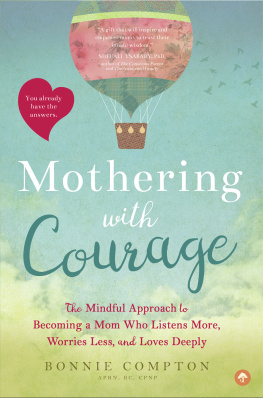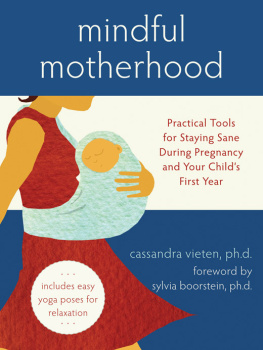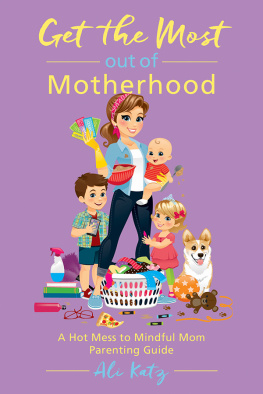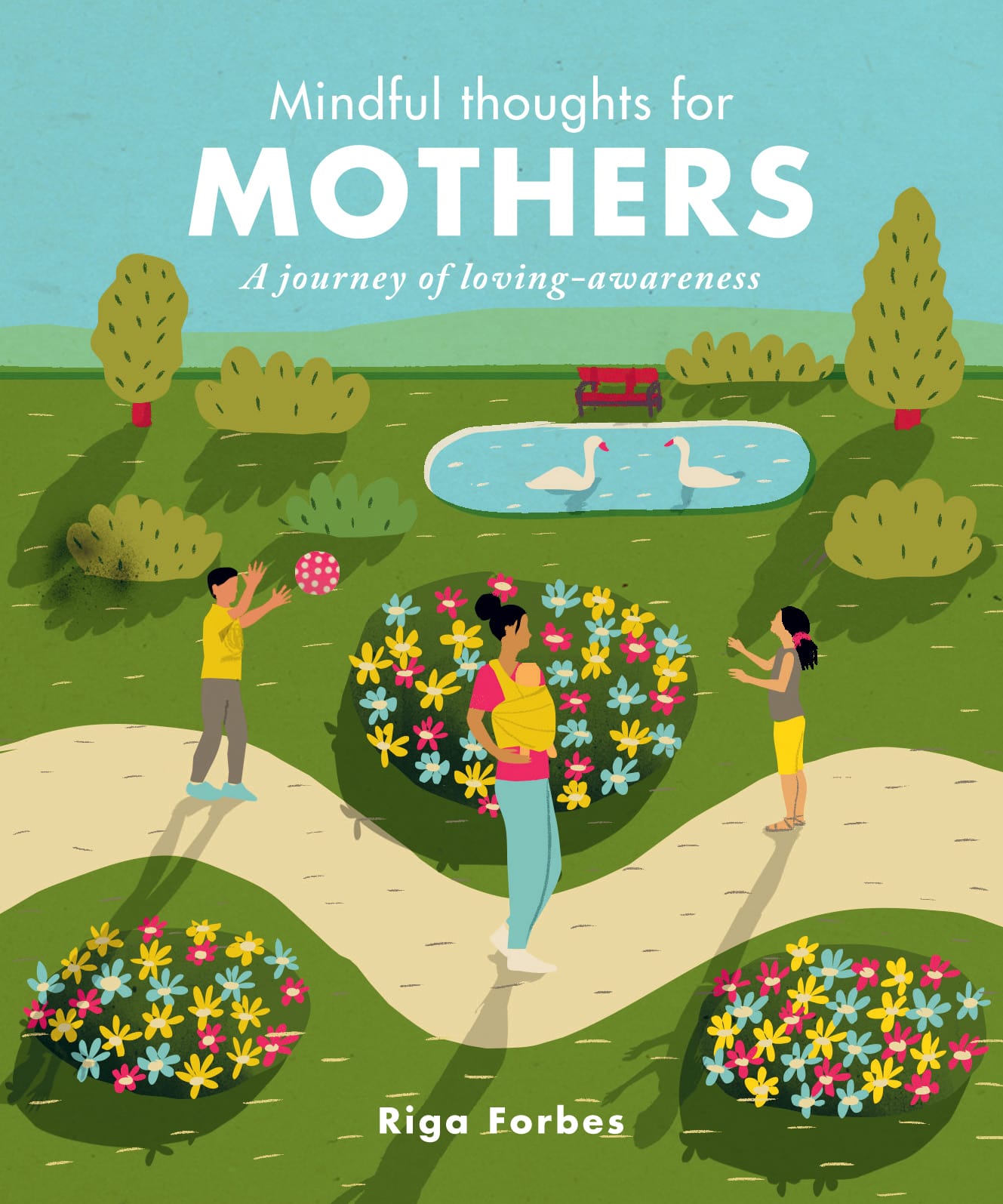Mindful thoughts for
MOTHERS
A journey of loving-awareness
Riga Forbes

INTRODUCTION
Mindfulness in
Mothering
Motherhood is one of the most wonderful and powerful experiences we can have in life. Yet for a mother, being able to relax and find her flow in the busyness of the world today is an absolute necessity. To begin with, we can potentially go through a lot during pregnancy, childbirth and beyond, which is both physically and emotionally intense. Our reserves overall might become depleted, for a time at least, and we can feel destabilized by these factors. As the early years of our childrens lives unfold, we will undoubtedly experience the heartfelt joys they bring, but will also encounter the stresses and demands that appear daily and nightly on the parenting path.

To manage these alongside the needs of our growing, dependent children, it is not enough for a mother to be just physically well; the task of mothering happy, relaxed children requires that we feel relaxed and happy too. Prioritizing our own enjoyment of life matters, and for the amazing and challenging task of mothering to be able to touch our hearts deeply, our lifestyle needs to support relaxation. Rest and exercise are vital, but slowing down our mental busyness will also enable us to become more conscious in how we meet the day to day.
Using mindfulness practice we can become quieter internally, helping us to release stress and to develop the discerning capacity to observe our thinking rather than simply being led by it. Gradually we can start to disengage from distracting thoughts by becoming more present and meeting life with awareness, in the moment. This can also enable us to find greater self-understanding and to choose how we want to be, which will support our parenting and, in turn, positively influence who our children are becoming.
And at the heart of mothering lies the navigation of relationships within a family. If we can address issues that arise between us with a mindful approach, becoming more present and receptive in our interactions, we may find that we can steer our way through friction or difficulties towards open-heartedness. By being compassionate we offer our children a more generous perspective on relating to others, which will travel with them a long way and may well help them to overcome their own hurdles in life. Our love matters so much. And making more space for quiet reflection and meditation can help us to keep our hearts open. When we consider the countless benefits this practice brings into our lives and the lives of our families, it might seem like a nourishing kind of reward for all that we do.
I have written this book for every one of you who chooses to take a few moments just for yourself to curiously glimpse through these pages. May it support you to find the spaciousness, insight and self-kindness that you deserve.
Love
A Beginning Without End
From pregnancy on, we are forever linked to each of our children in some way, even as they grow older and live independently. And we will always be in their thoughts, feelings and memories too, even beyond our own lifespan. The power of the mother-child bond, initiated in pregnancy and childbirth, is a deep-seated instinctual force that quite simply causes us to care about each other. Our relationship may be rocky at times, but for a mother there is likely to be a taproot of love for her to draw on in times of drought, an overriding sense of connection to the child who came through her into this world.

THE CYCLE OF GIVING
In the beginning, when we were so entwined with our babies, this sense of connection may have been tangible as we smelt our childs skin or the milk on their breath. We might have felt it in the warmth of their small body wrapped up against our own as we fed them, or through gazing at their face. The relationship of nurture between a mother and her baby or toddler asks that a mother receives a generous helping of the reward, and that she too feels the benefit of this cycle of giving, even when she is doing the lions share of it.
As we live through our childrens younger years alongside them, in that elastic-time that can seem gradual and rapid in equal measure, our loving mother-child connection will find other experiences on which to anchor itself sweet-funny child language and gestures, little rituals, games or interests that are unique to our child at that point in their lives, in which we participate. And when our children cross the bridge of maturity towards puberty and ultimately adulthood, this sense of connection may be more spacious, but at an unconscious level it will still be composed of their milky-breath smell and those funny words and the feel of their small hand in our own, because deep down we have known the whole picture from before their first breath, and we will always be able to feel it.
HEART-AND-MINDFULNESS
The mother-child bond is an amazing thing. Its power can make us protectors and champions of our childrens rights, wellbeing and happiness. It can influence our own life choices as we prioritize our children, and it can inspire us to challenge whatever might threaten their prospects for a happy future. The energy of motherhood can make us powerful, and powerful we are. But not in an exploitative sense. Mother-energy embodies a life force that is heart-centred because ultimately it is born from the love we feel for our children.
The Buddhist Sanskrit word citta can be translated to mean both mind and heart, and it encompasses both of these physical areas of the body along with their respective attributes of thought and feeling. But the term mindfulness comes from the word sati, which means awareness or remembering the truth of reality. In the West, where we are so cerebral in our approach to life, our idea of mindfulness is often influenced by the misunderstanding that mind means the brain. In fact, meditation engages citta, which is both brain and heart, and the awareness we encounter through regular practice may help us to observe our mental, emotional and physical states, but is ultimately seated in the heart. If it wasnt such a mouthful, I have often thought we should call meditation heart-and-mindfulness.
MAKING SPACE FOR SELF-LOVE
Heart-and-mindfulness speaks to the compassion-focused core of the motherhood journey, too. We know compassion, we feel it deep inside, we hold it when we hold our child or think of them not always, of course, but in essence. And compassion is an exceptionally beautiful thing. It is a healing force and it is so very much needed in the world right now. But it is even more potent when it comes from a place of authentic self-love in us, or from our intention to cultivate this.
As we travel along the path of motherhood, we might be conditioned by our intense early experiences of mothering, to focus on giving and providing love for others, yet we may forget to feel the love ourselves too. This is not a self-indulgent notion, but one whose effects can be far-reaching and reflect into every aspect of our lives. The more space we can make to consciously receive kindness, joy and care, the more real and nourishing our cycle of maternal loving can be. Allowing more mindful moments of each day to become clear pools from which we can drink in the goodness life has to offer, could be the treasure our maternal hearts seek.









